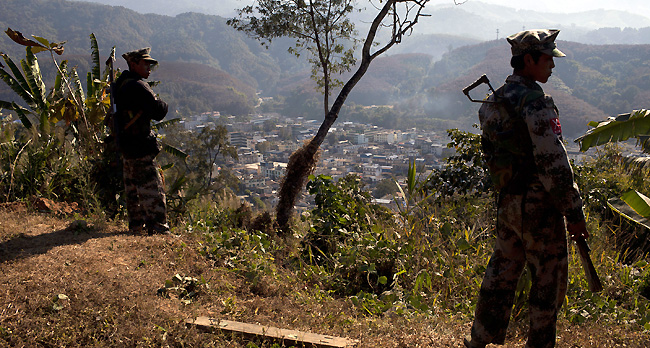Memo #320
Myanmar’s Nationwide Ceasefire Agreement has the potential to end decades of conflict, but a political solution will have to wait.
By Brandon Miliate – bmiliate [at] gmail.com
 Today there is the real possibility that Myanmar’s sixty-year history of ethno-national insurgencies might be coming to an end. After decades of stagnation and intermittent fighting, in 2013 both the country’s “ethnic armed organizations” (EAOs) and the central government in Naypyidaw agreed to begin negotiating a Nationwide Ceasefire Agreement (NCA). But despite notable progress, it seems unlikely that this NCA will establish the political concessions that will ultimately be necessary to ending the conflict permanently.
Today there is the real possibility that Myanmar’s sixty-year history of ethno-national insurgencies might be coming to an end. After decades of stagnation and intermittent fighting, in 2013 both the country’s “ethnic armed organizations” (EAOs) and the central government in Naypyidaw agreed to begin negotiating a Nationwide Ceasefire Agreement (NCA). But despite notable progress, it seems unlikely that this NCA will establish the political concessions that will ultimately be necessary to ending the conflict permanently.
EAO political leaders wanted an agreement that would go beyond current bilateral ceasefires by establishing a code of conduct, monitoring mechanisms, and the foundations for future political discussions. This past August, it looked like a deal was close when the government negotiation team announced that it would agree to a federal system “in principle.” However, since then the government has taken a more hard-line stance while continuing to attack Kachin Independence Army bases in northern Myanmar. These actions have attracted widespread condemnation, and forced further delays in the seventh round of peace talks.
Meanwhile, the EAOs themselves have failed to agree on a joint negotiating position. Some have argued that the NCA negotiations are distracting from the political reforms that will be fundamental to any lasting solution in the country. Furthermore, in September, the Karen National Union temporarily suspended its membership in the largest EAO alliance, and in October announced the creation of a new united armed force with 2 other Karen EAOs. Such developments have the potential to change the shape of NCA negotiations and complicate future cooperation between EAOs.
My own sense is that in spite of the setbacks and controversies, the NCA will be signed before the 2015 elections. However, it is unlikely that any political concessions will be made. Rather, all parties will agree to fast-track the NCA to start political negotiations later and garner international and domestic political capital before the elections.
In the end, political concessions will only come as the result of major changes to the 2008 constitution, and the willingness of the military to accept a decentralized political system. Both developments, however, remain some time away.
About the Author:
Brandon Miliate is a PhD Student in Political Science at Indiana University-Bloomington.

Members of the Kachin Independence Army guard a position near Laiza, in northeastern Myanmar (Credit: AP).
Links:
- Nilsen, Marte and Stein Tonnesson. “Can Myanmar’s 2008 Constitution Be Made to Satisfy Ethnic Aspirations?” Peace Research Institute Oslo. 2012.
- Lwin, Sandar. “Army will discuss federalism.” Myanmar Times, August 25, 2014.
- Naing, Saw Yan. “Ethnic Bloc Condemns Attacks on Kachin, Insists Talks Contine.” The Irrawaddy, November 26, 2014.
Related Memos:
See our other memos on Myanmar.
Comments are closed, but trackbacks and pingbacks are open.